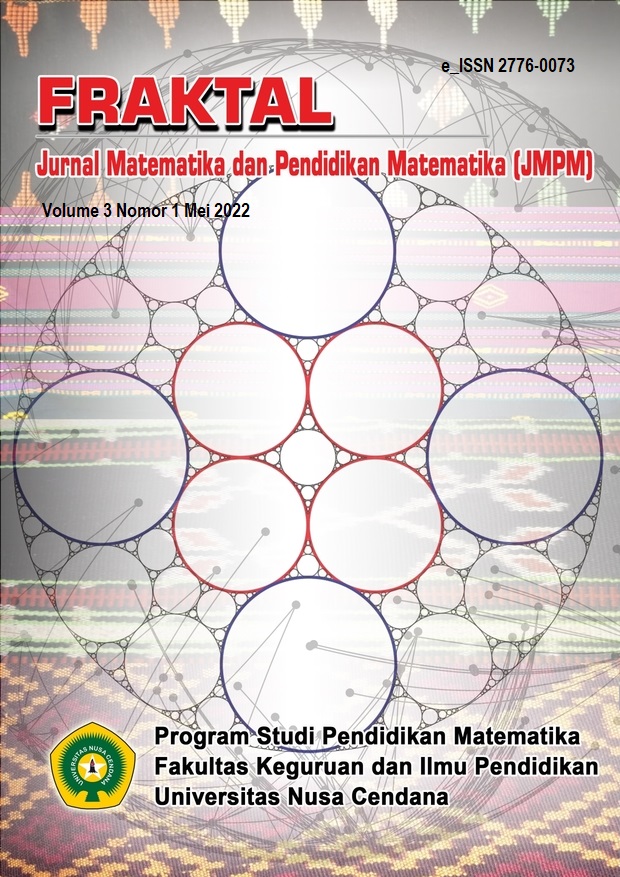Pengaruh Kemampuan Metakognitif Terhadap Indeks Prestasi Kumulatif Mahasiswa
Abstract
Grade point average (GPA) is an indicator that describes the quality of student learning process. Students’ GPA is actually influenced by various factors, including metacognitive ability. This study aimed to determine the effect of metacognitive ability on the GPA of students of Mathematics Education Study Program, FKIP University of Nusa Cendana in the 2021/2022 academic year. The population in this study were all active students of the mathematics education study program for the 2021/2022 academic year. The research sample was students from the 2019/2020 class, consist of 89 students, that were chosen randomly. The instruments used were metacognitive ability questionnaire, while the documentation is carried out to obtain students’ GPA data from the academic section of the mathematics education study program. The data obtained were analyzed statistically with simple linear regression analysis techniques using SPSS 25. The results showed that there was significant effect of metacognitive ability on the GPA of mathematics education students at the University of Nusa Cendana. This is indicated by the value of Fcount = 13.439 > Ftable = 3.951 and the value of sig = 0.000 < . It also found that the magnitude of the influence given by metacognitive ability variable on students’ GPA is 13,4%, while the other 86,6% is influenced by other variables. The results of this study also show the regression equation model .
Downloads
References
Andriyani, H. (2015). Hubungan Antara Kemampuan Metakognisi Dengan Hasil Belajar Mahasiswa Baru Pendidikan MIPA FKIP Universitas Mataram. (Skripsi). Universitas Mataram.
Anggresta, V. (2015). Analisis Faktor-Faktor Yang Mempengaruhi Prestasi Belajar Mahasiswa Fakultas Ekonomi Universitas Negeri Padang. Economica, 4(1), 19–29. https://doi.org/10.22202/economica.2015.v4.i1.325
Cetin, B. (2017). Metacognition and Self-regulated Learning in Predicting University Students' Academic Achievement in Turkey. Journal of Education and Training Studies, 5(4), 132-138.
Coutinho, S. A. (2007). The relationship between goals, metacognition, and academic success. Educate, 7(1), 39-47.
Fanggidae, J. J. R., Ekowati, C. K., Nenohai, J. M. H., & Udil, P. A. (2021). Klasifikasi Faktor-Faktor yang Mempengaruhi Prestasi Akademik Mahasiswa Pendidikan Matematika FKIP UNDANA dengan Metode CHAID. Fraktal: Jurnal Matematika dan Pendidikan Matematika, 2(1), 23–33.
Flavell, J. H. (1979) Metacognition and cognitive monitoring: A new area of psychological inquiry. American Psychologist, 34, 906-911.
Hasminidiarty. (2015). Faktor-Faktor yang Berkaitan dengan Prestasi Belajar Mahasiswa. Jurnal Ilmiah Universitas Batanghari Jambi, 15(3), 96-110.
Lestari, K. E., & Yudhanegara, M. R. (2018). Penelitian Pendidikan Matematika. Refika Aditama.
Masrura, S. I., & Murtafiah. (2018). Kontribusi Kesadaran Metakognisi dan Motivasi Belajar Matematika Terhadap Prestasi Akademik Mahasiswa FMIPA Universitas Sulawesi Barat. Jurnal Saintifik, 4(1), 74-82.
Panggayuh, V. (2017). Pengaruh kemampuan metakognitif terhadap prestasi akademik mahasiswa pada mata kuliah pemrograman dasar. JIPI (Jurnal Ilmiah Penelitian Dan Pembelajaran Informatika), 2(1), 20–25.
Susanto, H. A., Astutiningtyas, E. L., & Pratiwi, V. U. (2016). Metacognitive Skills and Grade Point Average. Global Journal of Pure and Applied Mathematics, 12(4), 3601–3607.
Syah, M. (2010). Psikologi Pendidikan dengan Pendekatan Baru. Bandung: Remaja Rosdakarya.
Ward, R. T., & Butler, D. L. (2019). An Investigation of Metacognitive Awareness and Academic Performance in College Freshmen. Education, 3(January 2020), 120–126.
Copyright (c) 2022 FRAKTAL: JURNAL MATEMATIKA DAN PENDIDIKAN MATEMATIKA

This work is licensed under a Creative Commons Attribution-NonCommercial-ShareAlike 4.0 International License.
- Hak publikasi atas semua materi naskah jurnal yang diterbitkan/dipublikasikan dalam situs E-Journal Fraktal ini dipegang oleh dewan redaksi dengan sepengetahuan penulis (hak moral tetap milik penulis naskah).
- Ketentuan legal formal untuk akses artikel digital jurnal elektronik ini tunduk pada ketentuan lisensi Creative Commons Attribution-ShareAlike (CC BY-SA), yang berarti Jurnal Fraktal berhak menyimpan, mengalih media/format-kan, mengelola dalam bentuk pangkalan data (database), merawat, dan mempublikasikan artikel tanpa meminta izin dari Penulis selama tetap mencantumkan nama Penulis sebagai pemilik Hak Cipta.
- Naskah yang diterbitkan/dipublikasikan secara cetak dan elektronik bersifat open access untuk tujuan pendidikan, penelitian, dan perpustakaan. Selain tujuan tersebut, dewan redaksi tidak bertanggung jawab atas pelanggaran terhadap hukum hak cipta.

 Patrisius Afrisno Udil(1*)
Patrisius Afrisno Udil(1*)










